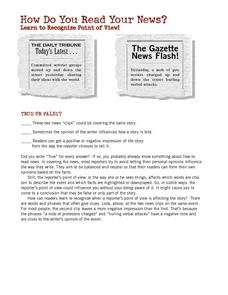Scholastic
Consider the Source
Who is more trustworthy when it comes to marijuana: a high school student, or The National Institute on Drug Abuse? Sources matter when reading informational text. Help teenagers discern which facts are true with an activity that focuses...
DePaul University
Bold Plans, Big Dreams, City Progress
Determining which statements represent fact or the author's opinion in an integral part of reading informational text. Encourage seventh graders to read a passage about Barack Obama and the city of Chicago, as well as a passage focused...
Scholastic
Heads Up: Real News About Drugs and Your Body
What's the difference between medical marijuana and marijuana bought on the street? Not much. High schoolers learn more about marijuana with an informational booklet that focuses on the medical uses of THC, how marijuana affects the...
PBS
How to Teach Your Students about Fake News
What media literacy skills do people need to evaluate a news source? Scholars listen to and discuss an NPR story about how fake headlines often dupe young people and adults alike. Next, they study news stories, using a fact-checking...
George W. Bush Presidential Library and Museum
Teaching Primary and Secondary Sources
What makes a source primary or secondary? Middle schoolers read a definition of each term before exploring different examples and applying their knowledge to a research project.
NOAA
Thunderstorms, Tornadoes, Lightning. . . Nature's Most Violent Storms
Thunderstorms, tornadoes, floods, and hail are just a few of the topics covered in a thorough weather preparedness guide. With descriptions of each weather phenomenon, from what causes them to how and when they occur to levels of...
TV411
How Do You Read Your News?
Words carry baggage. Class members are asked to consider the weight of words in an exercise that contrasts the word choices in two versions of the same event. Consider following the exercise with an activity in which pairs craft positive...
Curated OER
Justice Is Blind, Colorblind That Is
It's so interesting to see kids respond to articles about education. To start the day, prompt learners to discuss the words colorblindness and diversity. Then, split your class in two and have one side read an article from 2007 and the...
College Board
Evaluating Sources: How Credible Are They?
How can learners evaluate research sources for authority, accuracy, and credibility? By completing readings, discussions, and graphic organizers, scholars learn how to properly evaluate sources to find credible information. Additionally,...
iCivics
We the Jury
Learners take on the roles of jurors in a civil case to evaluate evidence and determine a verdict in this engaging online interactive experience.
Curated OER
Credible Sources on the Internet: What to Trust, What to Dismiss and When to Cite a Source
Wait, you mean researchers don't all use Wikipedia? Teach your class about intelligent research with a lesson about evaluating digital sources. The lesson starts with a quickwrite and includes vocabulary exercises and several...
Scholastic
Prescription Pain Medications
Students study different pain medications and their side effects. In this drug usage lesson students read articles and complete a worksheet.
Other popular searches
- Addition and Subtraction Facts
- 100 Subtraction Facts
- Drill 100 Subtraction Facts
- Subtraction Facts to 20
- Subtraction Facts to 100
- Addition Subtraction Practice
- Math Subtraction Facts
- Basic Subtraction Drills
- Subtraction Facts 11 18
- Basic Subtraction 0 10
- Related Subtraction Facts
- Subtraction Facts to 18













